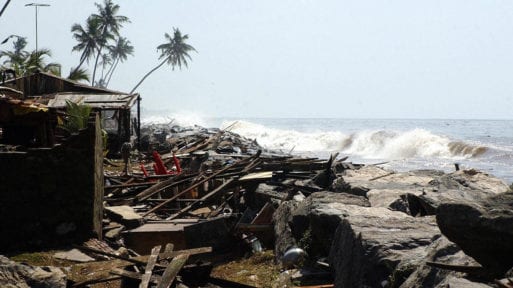 On Dec. 26, 2004, a magnitude 9.1 earthquake off the coast of Sumatra, Indonesia, set in motion a series of deadly tsunamis that took nearly a quarter of a million lives. The first 100-foot wave struck the Sumatran city of Banda Aceh shortly after 9 a.m, killing an estimated 100,000 people. About 90 minutes later, more waves arrived at the coastlines of India, Thailand and Sri Lanka, claiming an additional 125,000 lives.
On Dec. 26, 2004, a magnitude 9.1 earthquake off the coast of Sumatra, Indonesia, set in motion a series of deadly tsunamis that took nearly a quarter of a million lives. The first 100-foot wave struck the Sumatran city of Banda Aceh shortly after 9 a.m, killing an estimated 100,000 people. About 90 minutes later, more waves arrived at the coastlines of India, Thailand and Sri Lanka, claiming an additional 125,000 lives.
Five of those lives were the family of Sonali Deraniyagala, whose husband, two children and parents were killed. Deraniyagala chronicles the brief, horrifying tragedy and its long aftermath of suffering in her 2013 memoir “Wave.” Named by the New York Times as one of the Top 10 Books of 2013 and nominated for the 2014 Critics Choice Award, the book is an unflinching account of the author’s descent into near-madness and her long, arduous struggle to come to terms with her loss.
“Wave” begins with Deraniyagala looking out the window of a seaside hotel in Yala National Park on the southeastern Sri Lankan coast. Following a Christmas trip to her childhood home in Colombo, she, her husband Steve, their two children, Malli and Vikram, and their grandparents had spent the long weekend at the resort and were readying themselves to leave. Deraniyagala’s friend Orlantha had joined them on the trip, and it was to Orlantha that Deraniyagala first pointed out the slight rise in the level of the sea — just a little white froth — the curl of a big wave. She then called out to her husband, who was in the bathroom, to come look before it disappeared. But before Steve emerged, Orlantha recognized what was happening and screamed, “Oh my God, the sea’s coming in.”

A small portion of the devastation in Sri Lanka following the Indian Ocean earthquake and tsunami on Dec. 26, 2004
Credit: NPR
Therein begins a tragedy so horrifying it’s almost impossible to comprehend. Deraniyagala and her husband grab the children and run at breakneck speed through the hotel, not even stopping to bang on her parents’ door. They’re met at the entrance to the hotel by a stranger in a jeep, and the family tumbles in. The driver guns the engine, but within seconds a surging 30-foot wall of water has engulfed the car. A moment later, the jeep topples over, and everyone is swept away.
Only Deraniyagala survived.
The remainder of the memoir recounts Deraniyagala’s journey through grief with a resolve that is as stunning as it is raw. Never maudlin and virtually devoid of self-pity, the book is so brutally honest that it leaves the reader wondering how a person could suffer so deeply and survive. In the beginning, an almost catatonic Deraniyagala lies in bed in her parents’ home surrounded by friends, waiting to hear if any of the family has been found. She hears accounts of the disaster and for the first time realizes what had “come for us.” But none of it registers, and none of it matters as she asks herself over and over, “Why didn’t I die?”
Pieces of me hovered in a murky netherworld, timeless day after timeless day.
Then, some days after the tragedy, Deraniyagala’s brother breaks the news. “They found Ma and Da today … And I think also Vik. Can you remember what he was wearing? Was it a green shirt and black and white shorts, checked ones?” Deraniyagala neither cries nor faints, and thinks, “He is telling me that Vik is dead?” Then she tells herself, “I’ll wait until all the bodies are found, then I will kill myself.”
Yet, despite some valiant efforts, which include illicitly obtained sleeping pills washed down with massive quantities of alcohol, Deraniyagala clings to life. Steve’s parents travel from London (where he and Deraniyagala lived), to be with her, and she is cared for by several loyal Sri Lankan friends, who take turns guarding her day and night. Months go by, during which she wages a campaign of harassment against the Dutch couple that is renting her parents’ home. She sinks further into depression, numbing the pain with frightening quantities of drugs. But as time goes on, she slowly, painfully begins to emerge from the fog, though it will be years before she is able to face the world or any part of her former life.

Sonali Deraniyagala
Credit: NPR
I was terrified of everything because everything was from that life. Anything that excited them, I wanted destroyed. I panicked if I saw a flower. Malli would have stuck it in my hair. I couldn’t tolerate a blade of grass. That’s where Vik would have stamped … I had to make myself safe. I had to shrink my sight.
The ensuing chapters of Deraniyagala’s memoir unfold over a period of many years. She visits London and eventually is able to return to the home she shared with her family. The house is largely untouched, and Deraniyagala begins to remember and eventually relive the memories stored within its walls. Describing in vivid detail the real people who lived and loved there and their bustling, sometimes chaotic lives, Deraniyagala’s tone softens, and the cadence of her prose becomes less frenetic, more meditative, at times almost serene. Her pain remains enormous — I’m sure it is still enormous to this day. But as she recounts these memories, it’s clear that they are sustaining her in ways that nothing else has.
Seven years on, and their absence has expanded. Just as our life would have in this time, it has swelled. So this is a new sadness, I think. For I want them as they would be now. I want to be in our life. Seven years on, it is distilled, my loss. For I am not whirling anymore. I am no longer cradled by shock. And I fear, is this truth too potent for me to hold. If I keep it close, will I tumble? At times I don’t know.
But I have learned that I can only recover myself when I keep them near. If I distance myself from them, and their absence, I am fractured. I am left feeling that I’ve blundered into a stranger’s life.
“Wave” is a rare gem — a book about loss that is deeply felt, beautifully crafted, and unflinchingly truthful. I found it mesmerizing; as soon as I read the last page, I went back to the beginning and started reading it again. Deraniyagala’s story is heartbreaking, but the fact that she survived to tell it should serve as inspiration to anyone who has suffered a loss so overwhelming that they don’t believe they can carry on. The fact that Deraniyagala wrote this book is proof that they can.

 “Wave” by Sonali Deraniyagala
“Wave” by Sonali Deraniyagala


 Debating Medical Aid in Dying
Debating Medical Aid in Dying
 “Help Me, Helen”
“Help Me, Helen”















